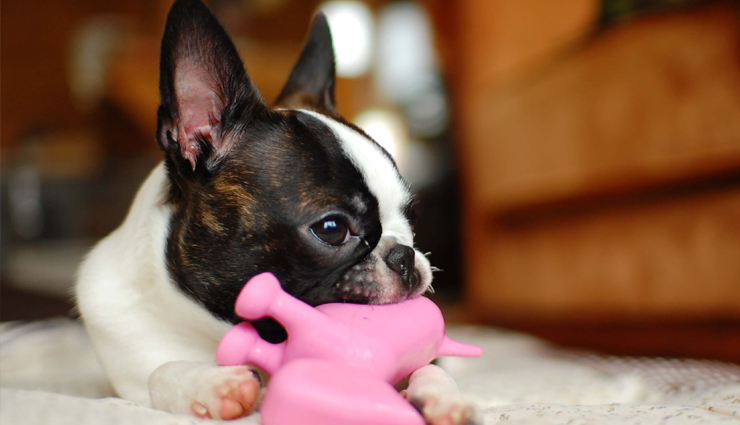
Chewing and Biting
Puppies are inquisitive by nature. As their teeth grow and they discover new objects and materials, it’s inevitable that they are going to bite and chew things. They will initially push the boundaries and try to chew the furniture in front of you. It’s important to know how to stop this from continuing. When you see your pup chewing at different things in your home, be firm and say “no”, continue to be consistent and make sure that they know that what they are doing is wrong. Every dog is different, so various behavioral techniques will have various success levels.
Some of the most successful techniques are non-aggressive. It’s important to remember that the end goal is to stop them chewing – not to scare them! These techniques include spraying your pup with water, to let them know that they are doing wrong. They will grow to associate this action with misbehavior and will alter their actions accordingly. Another unorthodox method is to spray your furniture and all chew-able objects with bitter apple spray – this is a natural and safe deterrent which will have your pups keeping their chops to themselves in no time.

Reprimanding your pup doesn’t always solve the chewing problem, so if you want your home to stay safe then it’s a good idea to invest in puppy fences that divide the room into “puppy safe zones”. A lot of people also use baby gates to stop their canine friends from getting to certain rooms, which can save you a lot of stress when you have to go to work! It’s a common misconception that puppies chew and bite furniture to misbehave, when in fact, it can often be an indication of malnutrition or hunger. Consider a No Chew Spray as well!
What to Feed Them
A puppy has a huge appetite and will eat a lot. Up to 6 months, you will need to feed them up to four times as much as an adult dog. A puppy should gain one to two grams per pound of adult weight each day. Puppy food needs to be higher in protein, and also enriched in vitamins, minerals and fats to help them to be healthy and grow into their skin. Make sure that you buy food that is specifically made for puppies, rather than just dogs, as this will ensure that it has more vitamins and minerals. Different dog breeds will have different dietary requirements, so always consult with the vet or breeder when selecting the right food to have.
A commonly known rule of thumb, is that a puppy must have a minimum of 5 minutes exercise per month of age until they are fully grown, then they can go out for much longer. A puppy needs exercise every day, so before you decide to bring one home, you need to consider how much time and attention you can dedicate to them.
Trips to the Vet
Protecting your home from your pup is important. But protecting your puppy is even more so, so make sure to regularly have them checked at the vets, given the right injections, and also have them microchipped, to ensure that if they become lost they can be safely returned. Dog microchipping can increase the chances of returning your pet safely by up to five times! Another option is to purchase a dog tracking collar.